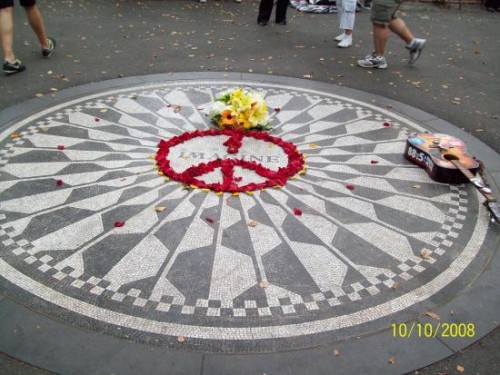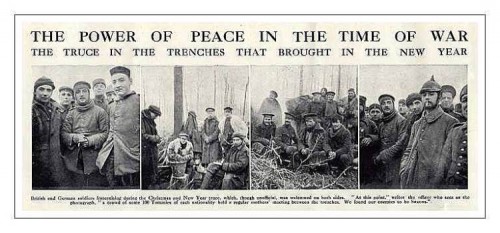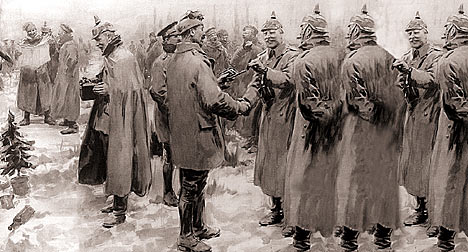How the year has flown. The following story is one I’ve shared before, first in 2013 and again in 2014.
It is a story that teaches us that peace can be found if individual men and women want it badly enough to set their differences aside and find what it is that unites them as human beings.
Today, in 2015, it is still a piece of history that must not be forgotten. Indeed, our history is rife with years, decades, centuries now, of being at war. If you’d like a quick reminder of what these wars have been, check out this washingtonsblog from earlier this year.

Cost and benefits: a simple ratio at its core.

In our story for today, The Christmas Truce of 1914, peace began with the music of Silent Night.

December 25, 1914
One Day When Enemies Stopped Fighting
On New Year’s Eve 2012, I was privileged to be in the audience when a small group of performers offered a song I’d never heard. Christmas In the Trenches so moved me, I came home that night and immediately looked it up. Google, once again, to the fore.
The song left me with the impression — and so I’ve believed for the past year — that this was a single incident. That in one trench, somewhere along the Western Front in 1914, German soldiers made an overture to their British enemies no more than 20 meters away, and they were acknowledged in a most heartwarming way.
HOWEVER, in preparing this blog, I’ve learned more. And the facts are even more remarkable than the story conveyed in song.
- This was not a one-time event. The song sums up the many informal cease-fires that occurred all along the 27-mile Western front. One report, later, said it was the entire Fifth Division.
- The Pope had called for a universal cease-fire on Christmas Day. But no one knew if his call would be followed. If anyone has made a connection, I haven’t found it.
- The British troops were professional soldiers; the Germans, were mostly conscripts.
- Photos of these gatherings made it into newspapers throughout the Western world.
The song I heard that New Year’s Eve was written by John McCutcheon in 1989, and is sung by him in these YouTube videos:
Christmas In the Trenches sung twice
Posted to YouTube by RIDEM25, this 6:28 video takes us through the song twice with orchestration and pictures of WWI sites, plus a few modern era photos of those same sites.
Christmas In the Trenches sung twice, plus singer-songwriter introduction
Posted to YouTube by John Huffman, this 6:49 video gives us the composer himself telling the story of how he wrote the song and how he’d met a few German vets who specifically came to show of his to hear him sing. We hear the song twice, with scenes from a re-enactment of the day and newspaper clippings from the era.
Christmas In the Trenches sung three times
Posted to YouTube by gail242000, this 7:40 video takes us through the song three times, twice with pictures from WWI, then once again with pictures from today’s many wars.
I’ll post the lyrics at the end, FYI.

If you want to get a fuller sense of the story,
I recommend the documentary/re-enactment, The Christmas Truce.
It’s an hour, but it’s worth it. And, unlike Miracle on 34th Street, it’s a true account of the “one day that shook the world.”
A different, seven minute documentary/re-enactment can be found here.
Additional points I learned from the various documentaries:
- Temperatures dropped below freezing; minus 4, some said.
- In December alone, the Germans had lost nearly 6,000; British, nearly 9,000. Yet it was the Germans who initiated these truces, over and over.
- Over a million soldiers would die on the Western front in 1914. By the end of the war, half of all soldiers would be killed or wounded.
- In one story, the two sides used the truce to bury their dead, and they buried them together in the “no man’s land” with a joint Christian service, alternating the recitation of The Lord’s Prayer in two languages.
I also began to understand what these soldiers had to fear from their own commanders. By essentially “fraternizing with the enemy,” considered a treasonable offense, they risked being put to death. But here are a few more facts.
- Up to half of the German front line was, at one time, “fraternizing with the enemy.”
- It’s unclear how many Brits. But we do know that when Commander General Horace Smith-Dorrien attempted to initiate court martial proceedings against some, he found too many had been involved for him to make an example of any one. As a result, not a single court martial occurred.
- In some quarters, the truce lasted days. In a few cases, into January. But, in the end, eventually, the war resumed when a Sgt. Collins was shot and killed on his way back from taking cigarettes to the Germans. The truce was over.

Here are the lyrics, as promised, and here is the recording, again
My name is Francis Tolliver. I come from Liverpool.
Two years ago the war was waiting for me after school.
From Belgium and to Flanders, to Germany to here,
I fought for King and country I love dear.
It was Christmas in the trenches where the frost so bitter hung.
The frozen fields of France were still, no songs of peace were sung.
Our families back in England were toasting us that day,
Their brave and glorious lads so far away.
I was lyin’ with me mess-mates on the cold and rocky ground,
When across the lines of battle came a most peculiar sound.
Says I “Now listen up me boys,” each soldier strained to hear
As one young German voice sang out so clear.
“He’s singin’ bloody well you know,” my partner says to me.
Soon one by one each German voice joined in, in harmony.
The cannons rested silent. And the gas cloud rolled no more,
As Christmas brought us respite from the war.
As soon as they were finished, and a reverent pause was spent.
“God rest ye merry, gentlemen” struck up some lads from Kent.
The next they sang was Stille Nacht. “Tis Silent Night,” says I.
And in two tongues one song filled up that sky.
“There’s someone comin’ towards us now,” the front-line sentry cried.
All sights were fixed on one lone figure trudging from their side.
His truce flag, like a Christmas star, shone on the plain so bright,
As he bravely trudged, unarmed, into the night.
Then one by one on either side walked into no-man’s-land.
With neither gun nor bayonet, we met there hand to hand.
We shared some secret brandy and we wished each other well,
And in a flare-lit football game, we gave ’em hell.
We traded chocolates, cigarettes, and photographs from home,
These sons and fathers far away from families of their own.
Tom Sanders played his squeezebox and they had a violin,
This curious and unlikely band of men.
Soon daylight stole upon us and France was France once more.
With sad farewells, we each began to settle back to war.
But the question haunted every heart that lived that wondrous night,
“Whose family have I fixed within my sights?”
Twas Christmas in the trenches where the frost so bitter hung.
The frozen fields of France were warmed as songs of peace were sung.
For the walls they’d kept between us to exact the work of war,
Had been crumbled and were gone forever more.
Oh, my name is Francis Tolliver. In Liverpool I dwell.
Each Christmas come since World War One I’ve learned its lessons well.
For the ones who call the shots won’t be among the dead and lame.
And on each end of the rifle, we’re the same.
— John McCutcheon “Christmas in the trenches” 1989

May this holiday season find you and yours at peace. And, to help, here’s a bit of laughter too.

Kathleen Pooler
Janet, IMHO, you could never post this powerful story enough. It highlights not only the senselessness of war but also the resilience of the human spirit. Enjoy your holidays!
Janet Givens
Thanks Kathy. And Merry Christmas to you and yours.
MY ANNUAL CHRISTMAS EVE POST – Janet Givens
[…] Here’s the link to last year’s post, which includes background and many links to further information. The song and lyrics follow below. […]
My Annual Christmas Eve Post for 2017 – Janet Givens
[…] Here’s the link to an earlier post, which includes background and many links to further information. […]